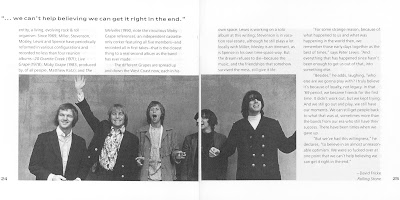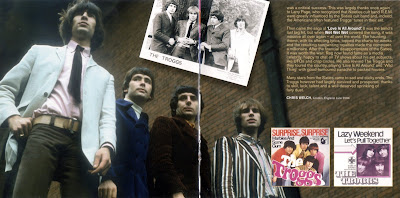When UK chart-toppers Brian Poole And The Tremeloes parted company in 1966, few would have wagered that the backing group would outdo the lead singer. Remarkably, however, the relaunched Tremeloes went on to eclipse not only Poole, but the original hitmaking act.
At the time of their reconvening in 1966, the lineup was comprised of Rick West (b. Richard Westwood, 7 May 1943, Dagenham, Essex, England; guitar), Alan Blakley (b. 1 April 1942, Dagenham, Essex, England, d. 1995; rhythm guitar), Dave Munden (b. 2 December 1943, Dagenham, Essex, England; drums) and Alan Howard (b. 17 October 1941, Dagenham, Essex, England; bass). In May of 1966 Howard was replaced by Mike Clark; however, a mere three months later his spot was taken by Len ‘Chip’ Hawkes (b. 2 November 1946, London, England), whose lead vocals and boyish looks gave the group a stronger visual identity.

In order to keep up with the times, the group members abandoned their stage suits in favour of Carnaby Street garb and fashionably longer hair. Their second-generation debut for Decca Records was a cover of Paul Simon’s ‘Blessed’, which proved unsuccessful. Seeking more commercial material, they moved to CBS Records and covered ‘Good Day Sunshine’ from the Beatles’ Revolver. In spite of radio play, it too failed to chart, but their third release ‘Here Comes My Baby’ (a Cat Stevens composition) smashed into the Top 20 on both sides of the Atlantic.

An astute follow-up with ‘Silence Is Golden’, previously the flip side of the Four Seasons’ ‘Rag Doll’, proved a perfect vehicle for the Tremeloes’ soft harmonic style and gave them their only UK number 1 and their highest US chart entry (number 11). Having established themselves as a hit act, they notched up an impressive run of hits during the late 60s including ‘Even The Bad Times Are Good’, ‘Suddenly You Love Me’, ‘Helule Helule’ and ‘My Little Lady’.
At the end of the decade, the Tremeloes seemed weary of their role in the pop world and broke away from their usual Tin Pan Alley songsmiths to write their own material. Their first attempt, ‘(Call Me) Number One’, was an impressive achievement, probably superior to the material that they had recorded since 1967.
When it reached number 2 in the charts, the group members convinced themselves that a more ambitious approach would bring even greater rewards. Overreacting to their dream start as hit writers, they announced that they were ‘going heavy’ and suicidally alienated their pop audience by dismissing their earlier record-buying fans as ‘morons’.
Their brief progressive phase was encapsulated in the album Master, which won no new fans but provided a final Top 20 single, ‘Me And My Life’. Thereafter, they turned increasingly to cabaret, where their strong live performances were well appreciated.
In 1974 Chip Hawkes went to Nashville, USA, to pursue an ultimately unsuccessful solo career (his son Chesney Hawkes would enjoy a brief moment in the spotlight in the late 80s). Blakley left the following January, and Aaron Woolley and Bob Benham were brought in as replacements.
The Tremeloes continued to record on an occasional basis, with albums being released by DJM Records and their old label CBS. They were still active in the new millennium, with Munden and West joined by Joe Gillingham (keyboards/vocals) and Davey Freyer (bass/vocals).
In September 2006 Poole and the band reunited after 40 years for a tour of the UK. The latest version of the Tremeloes featured Munden, Hawkes, West and newer members Gillingham and Jeff Brown.
The Tremeloes were another big British mainstream pop band during the second half of the sixties, whose most famous song was and is probably ''Silence Is Golden''. The band was also more of a 'single' band and it was in this market that their biggest sales were. In my opinion the band was musically more of a European pop band than a 'classic' Brit pop band. Those who like mainstream pop music of the sixties (and that's meant positively) will certainly not be disappointed with the band. Enjoy.(Frank)
Boxed Complete Artwork/Booklet


















































